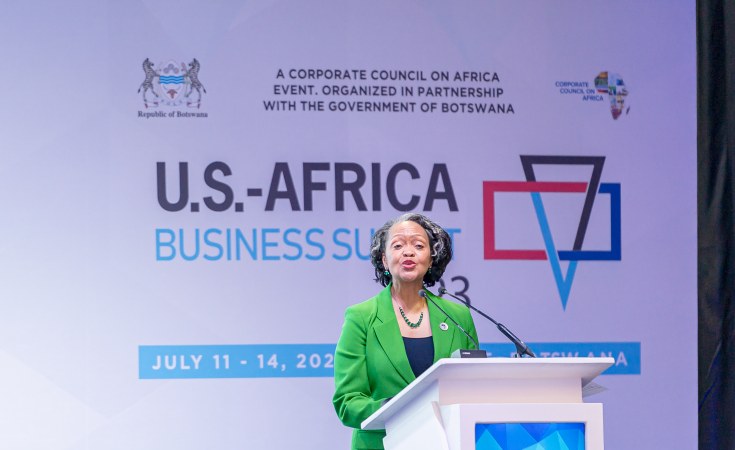Gaborone — Over 1,000 participants from the U.S. and across the African continent, including government officials, private sector executives, investors, and multilateral stakeholders, are meeting in Botswana's capital city of Gaborone at the U.S.-Africa Business Summit to explore investment opportunities and strengthen business relationships between Africa and the U.S.
"The U.S. is focused on what we will do with African nations and with African people and not for African nations and people as we work to deepen and expand our partnerships, amplify African voices, and support the empowerment of Africans," said Scott Nathan, Chief Executive Officer of the United States, International Development (DFC).
The 15th U.S.- Africa Business Summit, hosted by the Corporate Council on Africa (CCA) and the Government of Botswana in Gaborone, is under the theme Enhancing Africa's Value Chains.
"Through this annual summit, the CCA seeks to strengthen connections between the U.S. and Africa and to mobilize action as we have done for 30 years. CCA's member companies are crucial in that effort, along with partnerships with U.S. and African governments and multilateral organizations. These collaborations are crucial to fostering a deeper understanding in government of private sector interests and needs and equally important to helping the private sector gain a deeper understanding of policies and expectations," said Jeffrey Sturchio, Chairman of CCA.
Sturchio said such constructive collaborations benefit the people of the U.S. and Africans. As a result in the past three years, the U.S. Government has closed more than 900 deals valued at U.S.$22 billion across 47 African countries in trade and investment.
"At DFC we are committed to using our tools including loans, political risk insurance, and importantly equity investments to partner with African companies to unleash the power of the private sector and promote African-driven prosperity. Access to capital is the lifeblood of business and economic growth we are focused on mobilizing capital for the private sector. Already DFC has the largest share of our portfolio more than U.S.$11 billion dedicated to investment on the continent," said Nathan.
This summit comes six months after the U.S.- Africa Leaders Summit hosted by U.S. President Joe Biden in Washington DC where leaders committed to advancing trade, creating jobs, and fostering beneficial and sustainable relations.
"Since December we have committed another U.S.$110 million in financing to new projects in Africa. In recent weeks, DFC and our board of directors have approved more than U.S.$750 million in additional deals, in critical sectors such as infrastructure, energy, and support for small businesses. Already in countries ranging from Malawi to Nigeria to Senegal, DFC is investing to provide reliable access to power for communities that have never had it. From Ghana to South Africa to Kenya DFC is helping to expand data centers and critical 21st-century infrastructure and through DFC's support for innovative partnerships thousands of smallholder farmers across sub-Saharan Africa are increasing their harvest and connecting to larger global markets," said Nathan.
.
Nathan said this is a small sample of DFC's work but believes his department can still do more.
"Whether addressing climate impacts, promoting robust health systems and food security or building high-quality infrastructure, and even navigating difficult fiscal conditions, unleashing the power of the private sector is critical to delivering solutions," he added.
President Mokgweeng Masisi agrees, he believes that for Botswana to create an inclusive economy it needs more private sector involvement to drive value chain development in major industries ranging from mining, tourism, agriculture, and education.
Masisi said the U.S.- Africa Business Summit remains a crucial pillar of Africa's engagement in hosting African heads of state, U.S. and African government officials, top CEOs, and senior business executives spanning to major sectors that are critical to the continent's development including infrastructure, ICT, health, energy, mining, and creative industries.
"Despite being classified as an upper middle-income economy Botswana constitute less than 0.2% of Africa's population and contributes about 1% of Africa's GDP. As the world's largest diamond producer by value it is imperative that we develop value chains for raw materials to allow for greater value addition, and growth, adapt to climate change, build sustainability, deepen economic diversification, and create opportunities for the exportation of global supply chain," he said.
Over five decades since its independence, Botswana has transformed from one of Africa's poorest countries into an upper middle-income economy through its mining industry.
Masisi said there is a need for the country to fully integrate into the global economic system.
"It is on this basis that I wish to recognize and commend African leaders for the formation of the African Continental Free Trade Area. Once fully operational the ACFTA will build and strengthen integration and booth intra-Africa trade thus increasing value-added production trade across all valuable sectors of the continental economy and attaining the vision 2063, the Africa we want" he said.
Once fully operational Masisi imagines that the ACFTA will build and strengthen integration and boost intra-Africa trade thus increasing value-added production trade across all valuable sectors of the continental economy and attaining the vision 2063, the Africa we want.
He further expressed his desire for the Biden administration to keep its promise to renew the Africa Growth and Opportunity Act (AGOA), which expires in 2025, saying the AGOA renewal with the expanded mandate will give a strong signal and confidence to the markets and serve as the catalyst for Africa's industrialization and inclusion to the global value chains.


